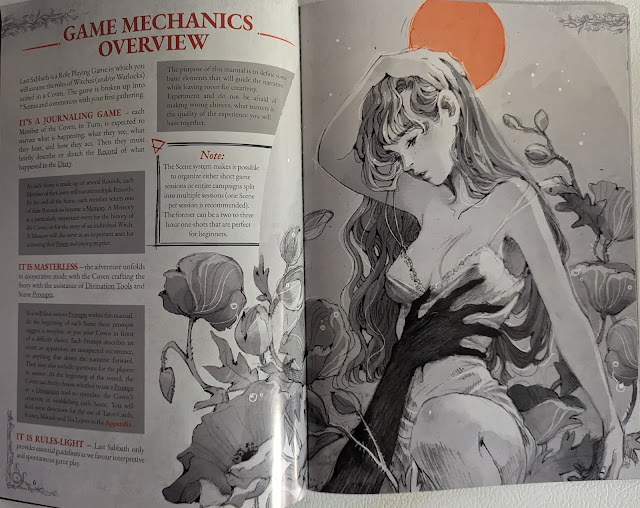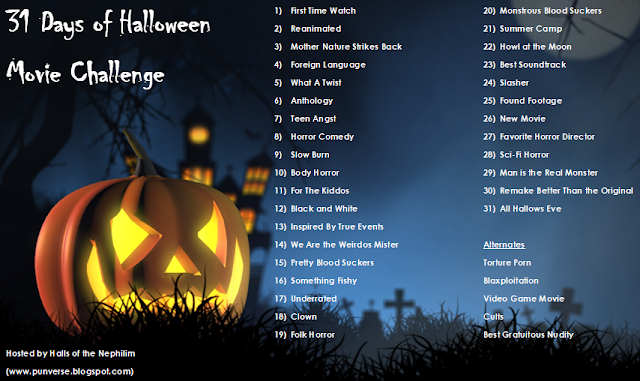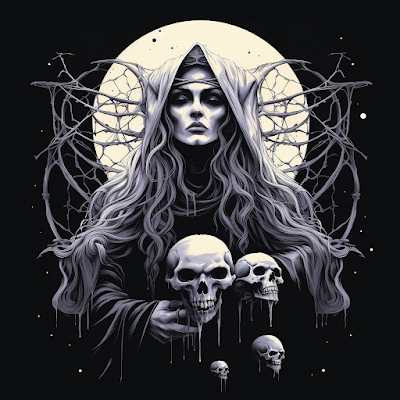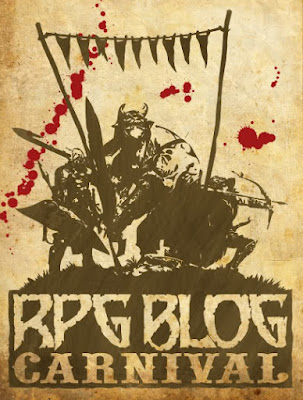Last Sabbath RPG
Design by Atropo Kelevra and Valentino Sergi. Art and illustrations by Loputyn (Jessica Cioffi). The game was based on Loputyn's artistic vision. Paperback, saddle stitched book. Black & white (with red foil covers). 48 pages.
This is the English translation of the original Italian RPG.
Last Sabbath is a Masterless, Journalling RPG for 1 to 7 players. Masterless in that no one player is the game master and journalling since the players will write down what their characters (all witches) will do in each scene.
Now, I am not overly familiar with playing Journalling RPGs, but I know what they are in concept.
In this game, the players all play new witches who have gathered together in a Coven. Why? Well, that is what everyone will find out together. I say up yo seven people since that seems to work well with the structure of the game, but 4 might be more wieldy. It can also be done as a solo RPG experience.
The game offers many aids to move the players (and the characters) along. If this is the Coven's first time playing or this is a solo effort, then the authors suggest using the Scene Prompts instead of the divination techniques. That is a good idea, but the divination techniques add a bit of randomness to the game that I quite like. So, at this point, what is required of the players are these rules, notebooks to journal in, a d6, and maybe some divination tools. More on those later. While a fancy journal would be a nice touch here, a regular notebook is also good. Since you will be sacrificing memories here as part of game play it is somewhat cathartic to write them down and then tear out the page.
The game setting is whatever you want it to be. That and the nature of the witches involved are entirely up to the players.
Safety tools are recommended because this game encourages you to push the boundaries. It is all part of the idea that magic is both a gift and a curse. Bad things are going to happen to your character.
Game Play
The game is divided into Seven Scenes. The Call, Initiation, Danger, Investigation, Revelation, Threat, and Epilogue. Each scene is then divided into 3, 5, or 7 turns (players' choice). When all players have done their Turn, you move on to the next one.
At the end of every scene, one of the Records (what the player wrote down) becomes a Memory. Memories can be sacrificed for Power to fuel their magic. But removing the wrong memory can cause a witch to forget why she is part of the coven.
Turns are covered with some examples of a 3-round game plane for a Scene.
Guidelines for play follow. Witches can ask one question of a fellow witch once per turn or answer a question on their turn. If a Power is used, then the affected witch must respond to that power on their turn.
Power
Without magic, the characters are just people sitting in a circle. And while that would be a fine game, not one I would review here. Power is what makes witches witches. Power comes in the forms of a Charm, Spell, or an Incantation, each with great effects and greater costs. Some incantations, for example, can cost the witch her life. So yeah, power comes at a cost. Some examples of powers are given, including origin and types. But the details are left to the players to figure out.
Divination
This just gives us a brief idea on how they are to be used. Details are given later with the various types of divination tools.
The Scenes
Half-way through the book we reach the Scenes, or how the game progresses. Anything can happen in a scene including the death of a witch. Players should not worry about that since they can introduce a new witch in the next scene. Each scene is given some guidelines in the form of leading questions and some prompts. For example, for Scene 1: The Call, one of the prompts is "A call for help is heard in your mind" (paraphrasing). Witches can choose or they can roll a d6.
All the scenes are handled in similar fashions, with Scene 7: Epilogue as the adventure conclusion.
Divination Tools
This section covers various divination tools which are broken down by tool with examples for each scene. These include Tarot, Rune stones, Mikado, and Tea Leaves.
Tarot is likely going to be the goto, but there is a certain charm to the Tea Leaves, especially if you have plenty of tea on hand while playing.
Last Sabbath - Grimoire
by Atropo Kelevra and Valentino Sergi. Black & white art with red. 36 pages.
This is a Kickstarter add on for the Last Sabbath RPG. It has additional thematic prompts for the LAst Sabbath RPG. At first I was curious why it was not added to main RPG. But reading through I see why, the prompts are great but should be used sparingly since they could force the game into a direction not set by the players. They are perfect when the players might want some advice on what to do nest, or even for a second play through.
The art of this book is not from Loputyn, though it is good in its own right.
Thoughts on this Game
My experience with games like this are a little limited. But this looks like fun and would work great in the hands of the right group. I see this as a good way to spend a rainy afternoon with some like mind friends over pots of hot tea. Save the Dr. Pepper and Doritos for D&D night. This is for orange zest scones and black tea.
If you are the type that wants really crunchy rules, then I would say this not the game for you. But I recommend you at least check out something like it.
Thoughts on the Art
The art is striking, evocative and perfect for the feel of this game. This is expected since the game grew out of the artistic vision of Loputyn (Jessica Cioffi). The art might be considered risqué to American audiences, but for European ones, I am sure this is just slightly above comic book fare.
Use as a Session 0
Back when I first talked about this game, I mentioned it as a possible Session 0 for my War of the Witch Queens. I am more convinced about that than ever.
In fact, I can see this game being interspersed with War of the Witch Queens adventures. Since the overall arc of that campaign is to discover who murdered the High Queen of Witches.
 |
| Tea with the Witch Queens by Brian Brinlee |
I have some major NPCs (all posted with stats) that enter into the tale/campaign. For my play test of this I took them and put them all through a couple of scenes of this game to figure out what their motivations will be. It was quite fun, to be honest.
I can also see it working as a Session 0 for a NIGHT SHIFT game consisting mostly of witches.
While I have the Smith-Waite Tarot deck pictured above, the perfect deck for this will be released next month: the Loputyn Oracle. It is published by Llewellyn Publications, pretty much THE publisher for all things mystical and witchy. Though it only has 32 cards, it should be fine for this game to be sure.
There is a lot of things I can use this game for, and I am looking forward to trying them all. Now. time to put the kettle on.
Links
Where to buy
Creative Team













